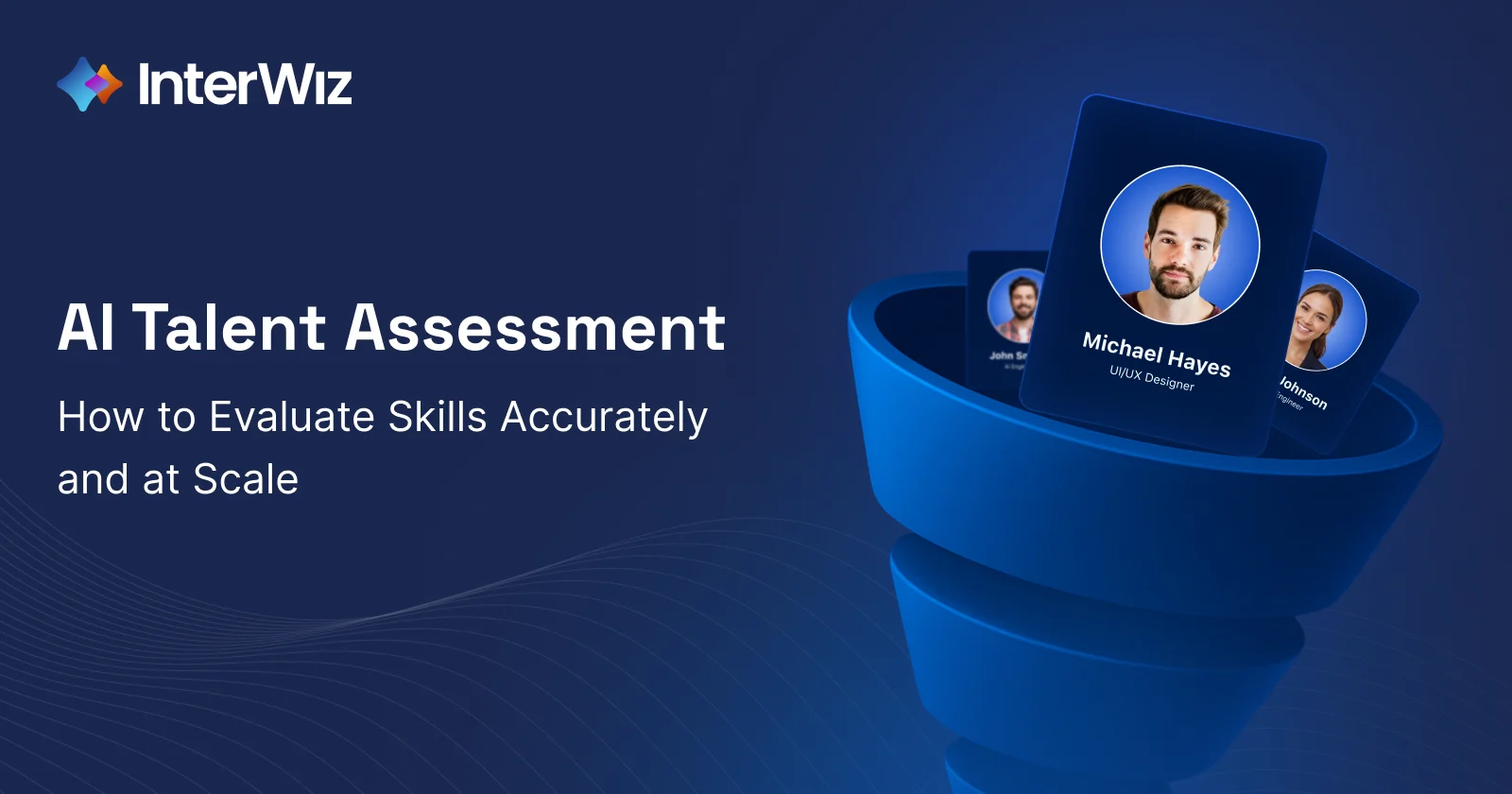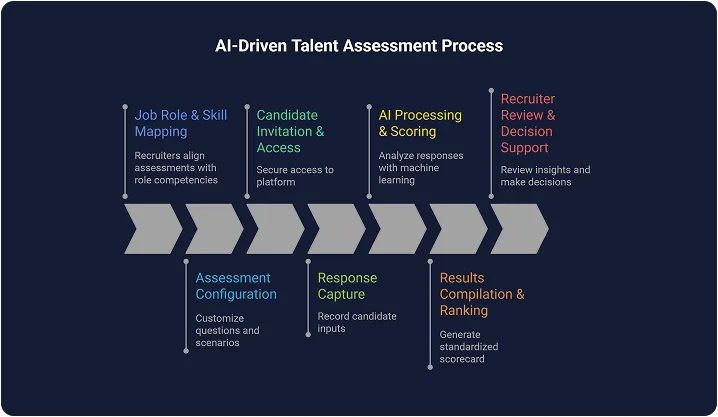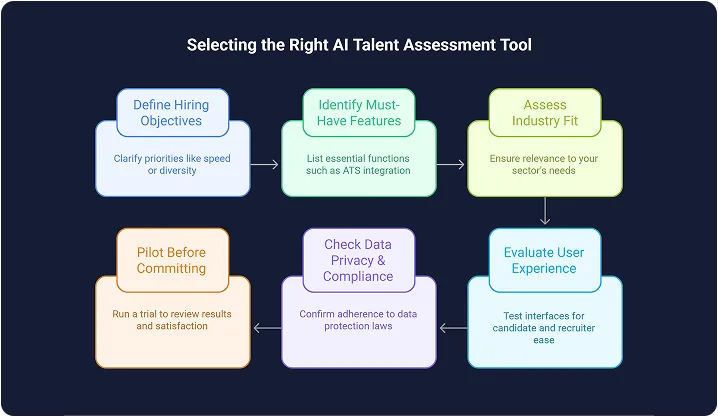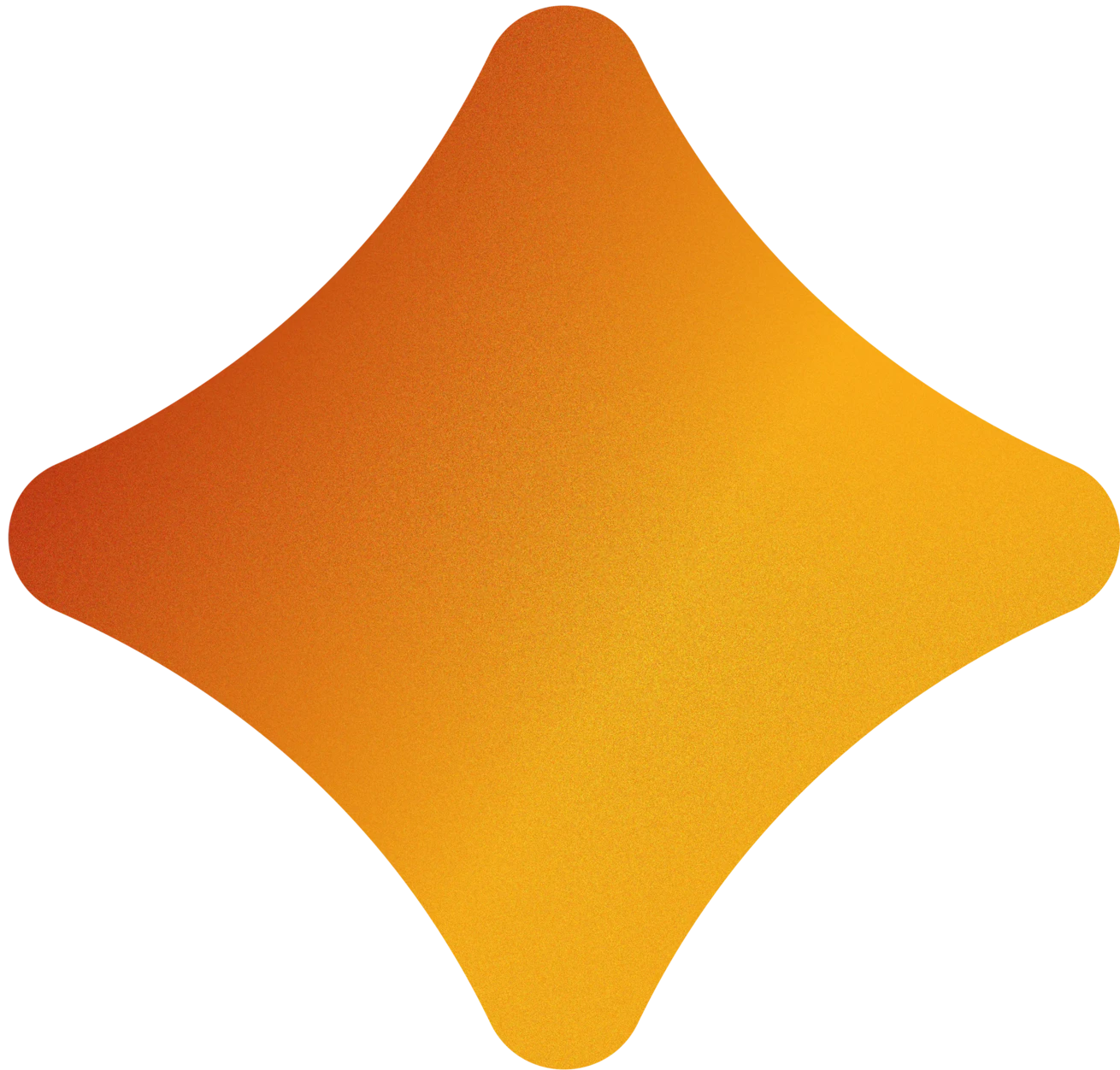AI-Led Interviews | Hiring Best Practices
AI Talent Assessment: How to Evaluate Skills Accurately and at Scale

AI-driven talent assessments can cut time-to-hire by 36% and improve quality-of-hire metrics by up to 92% (Aptitude Research, 2024). For organizations competing in a fast-moving talent market, that level of precision and speed can mean the difference between securing top talent and losing them to competitors.
AI talent assessment uses advanced algorithms, natural language processing, and data analytics to evaluate a candidate’s skills, personality, and fit more objectively than traditional methods. Instead of relying solely on resumes or interviewer impressions, these tools measure real-world capabilities through coding challenges, scenario-based simulations, language tests, and behavioral analysis.
In this guide, you’ll learn what AI talent assessment is, how it works, the key features to look for, and how to choose the right tool for your hiring needs. You’ll also see how it compares to traditional testing, where it excels, and what ethical considerations to keep in mind when adopting it.
What Is AI Talent Assessment?
AI talent assessment is the use of artificial intelligence to evaluate a candidate’s skills, knowledge, and role fit through automated, data-driven testing. Unlike traditional assessments that often rely on manual scoring or subjective impressions, AI tools analyze multiple data points, from test results and behavioral cues to communication style and problem-solving approaches, to produce objective, standardized evaluations.
These platforms typically combine technologies such as natural language processing (NLP), computer vision, and machine learning to assess both hard and soft skills. For example, an AI system might evaluate how accurately a developer completes a coding challenge while also analyzing tone, pace, and clarity in a recorded response to gauge communication skills.
In essence, AI talent assessment tools evaluate candidates objectively and at scale, enabling recruiters to make faster, more accurate hiring decisions. By removing human bias from the initial screening process, they help organizations create fairer, more consistent evaluations across all applicants.
Why Companies Are Switching to AI for Skills Evaluation
Organizations are turning to AI talent assessment because traditional evaluation methods are too slow, inconsistent, and prone to bias. In competitive hiring markets, delays in screening and subjectivity in scoring can cause top candidates to drop out before an offer is made.
AI tools address these challenges by providing:
Speed – Automated scoring and instant reporting can compress multi-day evaluation cycles into minutes.
Accuracy – Machine learning models can detect skill gaps and match candidates to roles with high predictive validity.
Bias Reduction – Standardized criteria ensure candidates are judged on performance, not personal characteristics.
Scalability – Thousands of assessments can run simultaneously without overwhelming recruiters or hiring managers.
A 2024 Gartner HR Tech study found that companies implementing AI-driven assessments saw a 28% increase in hiring efficiency and a 22% improvement in diversity of hires compared to those using traditional tests.
By solving the bottlenecks of manual evaluation, AI enables recruiters to focus on higher-value work: engaging candidates, improving employer brand, and making informed hiring decisions.
How AI Talent Assessment Works (Step-by-Step)
AI talent assessment tools follow a defined sequence that moves from candidate setup to final hiring recommendations:

1. Job Role & Skill Mapping
Recruiters select or create assessments aligned with the role’s competencies. The system maps required skills, such as programming proficiency, problem-solving, or communication, to specific test modules.
2. Assessment Configuration
Questions, scenarios, or challenges are customized, often pulling from a library of validated content. Tools may include coding environments, video interview prompts, or personality questionnaires.
3. Candidate Invitation & Access
Candidates receive secure, timed access to the assessment platform via email or ATS integration. Some systems allow self-scheduling for video-based tasks.
4. Response Capture
The platform records candidate inputs, which could include code submissions, multiple-choice answers, typed responses, spoken answers, or video responses. It may also track behavioral signals like keystroke dynamics or eye movement (if permitted).
5. AI Processing & Scoring
Machine learning algorithms analyze the responses:
NLP for communication skills and language proficiency
Code analysis for accuracy, efficiency, and logic
Behavioral models for decision-making style and adaptability
Psychometric analysis for personality and cultural fit
6. Results Compilation & Ranking
The system generates a standardized scorecard, ranking candidates by overall performance and per-skill breakdown. Recruiters can apply weightings to prioritize certain skills.
7. Recruiter Review & Decision Support
Hiring teams review AI-generated insights alongside human judgment. Shortlists are created, interviews are scheduled, or offers are extended based on the results.
In effect, AI assessments replace fragmented manual screening with a single, streamlined pipeline, moving from role definition to data-backed candidate selection.
Key Features to Look for in AI Talent Assessment Tools
Choosing the right AI talent assessment platform starts with knowing which features actually impact hiring outcomes. The most effective tools typically include:
Hard skills testing – Role-specific coding challenges, analytical reasoning tasks, and domain knowledge assessments.
Soft skills & personality evaluation – Behavioral simulations, scenario-based questions, and NLP-based communication analysis.
Customization & branding – Add custom questions, adjust weightings, and embed employer branding for a consistent candidate experience.
Integrated video interviewing – Capture video responses with automated transcription, sentiment analysis, and key-phrase detection.
Automated scoring & analytics – Instant scoring with ranked shortlists, skill breakdowns, and benchmark comparisons.
ATS & HRIS integration – Secure, native connections to applicant tracking and HR platforms for seamless data flow.
Compliance & accessibility – Built-in privacy controls, bias-reduction safeguards, and candidate-friendly accessibility options.
Example in Practice: InterWiz combines technical skill testing, soft skill analysis, and automated scheduling, enabling recruiters to create assessments, get ranked results, and move to AI interviews without switching tools.
AI Talent Assessment vs. Traditional Testing
Traditional candidate testing methods often focus on static knowledge checks, while AI-driven assessments evaluate real-world skills dynamically and at scale. The table below compares both approaches across key hiring factors.
Factor | Traditional Testing | AI Talent Assessment |
Speed | Manual scoring can take days or weeks. | Automated scoring delivers results in minutes. |
Accuracy | Often limited to surface-level knowledge evaluation. | Measures both technical and soft skills with high predictive validity. |
Bias Reduction | Prone to subjective grading and interviewer bias. | Standardized, data-driven scoring minimizes human bias. |
Scalability | Difficult to test large applicant volumes without more staff. | Can assess thousands of candidates simultaneously. |
Candidate Experience | Generic, often lengthy tests with limited feedback. | Adaptive, engaging, and provides tailored feedback. |
Integration | Standalone, requiring manual data transfer. | Connects seamlessly with ATS and HR platforms. |
Cost Efficiency | Higher labor costs for administration and review. | Reduces manual workload, lowering per-hire costs. |
Example in Practice: An InterWiz-style AI assessment not only scores technical skills but also analyzes communication, problem-solving, and adaptability in a single session, something traditional tests rarely achieve without multiple rounds.
Real-World Applications Across Industries
AI-driven assessments aren’t limited to tech-heavy roles; they’re adaptable across multiple industries and job functions. By tailoring the assessment type to the skills that matter most, organizations can improve hiring accuracy across the board.

Tech & IT
Software firms use AI coding challenges, debugging simulations, and system design tasks to measure problem-solving and technical depth. For example, a cloud services company might assess how quickly a candidate identifies and resolves API errors in a live coding environment.
Customer Service & Support
Scenario-based simulations evaluate empathy, communication clarity, and problem-resolution skills. A telecom provider, for instance, might use role-play prompts to see how candidates handle frustrated customers under time pressure.
Sales & Business Development
AI tools can analyze video responses to detect persuasive language, negotiation style, and confidence. A SaaS sales team could simulate a pitch meeting and score candidates on rapport-building and objection handling.
Healthcare
Assessments for nursing or administrative staff might combine knowledge checks on medical protocols with situational judgment tests to gauge decision-making under stress.
Leadership & Management
Strategic thinking simulations present candidates with business challenges, requiring them to prioritize actions and allocate resources. AI measures logic, clarity, and adaptability to gauge leadership readiness.
Benefits of AI Talent Assessment
AI talent assessments give recruiters a sharper, faster, and more consistent way to identify the right candidates. Beyond streamlining the hiring process, they improve decision quality and reduce risks associated with poor hiring choices.
Faster hiring cycles – Automated scoring and ranking shorten time-to-hire by days or even weeks.
Bias-reduced evaluations – Standardized scoring ensures every candidate is measured against the same criteria.
Improved quality of hire – Predictive analytics match candidates to roles based on performance indicators, not just credentials.
Scalability – Assess hundreds or thousands of applicants without overloading recruiting teams.
Enhanced candidate experience – Short, adaptive assessments keep candidates engaged while providing timely feedback.
Example in Practice: Recruiters using platforms like InterWiz can move from assessment to shortlist in hours, making it easier to secure top talent before competitors do.
Limitations and Ethical Considerations
While AI talent assessments offer speed and objectivity, they are not without limitations. Over-reliance on algorithms can overlook nuances that a skilled human interviewer might catch, such as subtle cultural fit indicators or unique problem-solving approaches that fall outside the model’s scoring framework.
There are also ethical considerations:
Data privacy – AI platforms collect sensitive personal and performance data, which must be stored and processed in compliance with regulations like GDPR or CCPA.
Algorithmic bias – Even with safeguards, biased training data can produce skewed results. Regular audits and diverse datasets are essential to reduce this risk.
Transparency – Candidates should know what is being measured, how scores are calculated, and how results will be used.
To mitigate these concerns, organizations should use AI assessments as decision-support tools, not final verdicts. Combining AI-driven insights with human judgment ensures a more balanced, fair, and context-aware hiring process.
How to Choose the Right AI Talent Assessment Tool
Selecting the right AI assessment platform means matching its capabilities to your hiring goals, technical requirements, and compliance needs. Follow these steps to make an informed decision:

1. Define Your Hiring Objectives
Clarify whether you’re prioritizing speed, quality-of-hire, diversity, or role-specific skill evaluation. This will help you focus on platforms that excel in those areas.
2. Identify Must-Have Features
List essential functions such as technical skills testing, soft skill evaluation, customizable assessments, ATS integration, and compliance certifications.
3. Assess Industry Fit
Ensure the tool offers assessment types relevant to your sector. For example, tech companies may need live coding environments, while customer service teams may value scenario-based communication tests.
4. Evaluate User Experience
Test the candidate and recruiter interfaces. A poor user experience can damage an employer's brand and candidate engagement.
5. Check Data Privacy & Compliance
Confirm the platform meets local and international data protection laws and has measures to reduce algorithmic bias.
6. Pilot Before Committing
Run a short trial with a small hiring batch. Review results for accuracy, recruiter usability, and candidate satisfaction before scaling up.
How InterWiz Fits Into Modern AI Talent Assessment
For organizations seeking a unified solution that handles both skill evaluation and interview management, InterWiz offers a platform that combines:
Technical & soft skills testing in one workflow, from coding challenges to communication analysis.
Automated interview scheduling to eliminate back-and-forth coordination.
Customizable assessments aligned with role-specific competencies.
Candidate ranking & analytics to help recruiters focus on top performers quickly.
ATS integration for seamless hiring workflows.
Because InterWiz runs skill assessments and in-depth AI-led interviews in the same environment, hiring teams can move from screening to final decision without switching tools, reducing time-to-hire by up to 40% and improving hiring accuracy by 95% (based on internal performance data).
Bottom Line: AI Talent Assessment
AI talent assessment isn’t just a hiring trend; it’s a proven method for making faster, fairer, and more accurate hiring decisions. By automating skill evaluation, reducing bias, and delivering actionable insights, these tools allow recruiters to identify top performers before competitors do. The key is selecting a platform that aligns with your role requirements, integrates seamlessly with your hiring process, and complements human judgment with reliable, data-driven results.
FAQs about AI Talent Assessment
What is the difference between AI talent assessment and traditional testing?
Traditional tests often measure static knowledge through manual scoring, while AI assessments evaluate both hard and soft skills in real time, using data-driven scoring to reduce bias.
Can AI talent assessments replace human interviews?
No, they should complement, not replace, human interviews. AI provides standardized insights, but human reviewers add context and nuance.
Are AI talent assessments compliant with hiring laws?
Most reputable platforms follow regulations like GDPR and EEOC guidelines, but compliance also depends on how your organization configures and uses the tool.
Do candidates like AI assessments?
If designed well, AI assessments can improve candidate experience by being shorter, more relevant, and providing faster feedback.
How can I ensure fairness in AI assessments?
Use platforms with bias-reduction measures, regularly audit results, and combine AI outputs with human decision-making.

High Quality Screening with AI Interviews
Automated interviews built for speed, scale, and accuracy.
🔥 Full features, no credit card required.